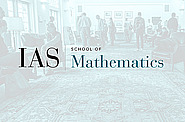Seminars Sorted by Series
Computer Science/Discrete Mathematics Seminar I
Mar
24
2025
Computer Science/Discrete Mathematics Seminar I
Efficiency, Resilience, and Artificial Intelligence
Moshe Y. Vardi
10:30am|Simonyi Hall 101 and Remote Access
Mar
31
2025
Computer Science/Discrete Mathematics Seminar I
Improved Private Information Retrieval Schemes from Matching Vectors and Derivatives
Swastik Kopparty
10:30am|Simonyi Hall 101 and Remote Access
Apr
21
2025
Computer Science/Discrete Mathematics Seminar I
Language Generation in the Limit
Jon Kleinberg
10:30am|Simonyi Hall 101 and Remote Access
May
05
2025
Computer Science/Discrete Mathematics Seminar I
Coboundary Expansion Inside Chevalley High-Dimensional Expanders
Ryan O'Donnell
10:30am|Simonyi Hall 101 and Remote Access
May
12
2025
Computer Science/Discrete Mathematics Seminar I
The Sample Complexity of Smooth Boosting and the Tightness of the Hardcore Theorem
Guy Blanc
10:30am|Simonyi Hall 101 and Remote Access
Sep
15
2025
Computer Science/Discrete Mathematics Seminar I
Combinatorial and Geometric Challenges in PAC Learning with Partial Concepts
Shay Moran
11:00am|Simonyi Hall 101 and Remote Access
Sep
22
2025
Computer Science/Discrete Mathematics Seminar I
Balancing Extensions in Posets of Large Width
Maxwell Aires
11:00am|Rubenstein Commons | Meeting Room 5
Sep
29
2025
Computer Science/Discrete Mathematics Seminar I
Asymptotic Spectrum and Approximation Approaches to Direct-sum Problems
Jeroen Zuiddam
11:00am|Simonyi Hall 101 and Remote Access
Oct
06
2025
Computer Science/Discrete Mathematics Seminar I
Stronger Cell Probe Lower Bounds via Local PRGs
Oliver Korten
11:00am|Simonyi Hall 101 and Remote Access
Oct
13
2025
Computer Science/Discrete Mathematics Seminar I
Adaptive Robustness of Hypergrid Johnson-Lindenstrauss
Andrej Bogdanov
11:00am|West Bldg. Lecture Hall
Oct
20
2025
Computer Science/Discrete Mathematics Seminar I
Deep Thoughts on Shallow Quantum Circuits
Francisca Vasconcelos
11:00am|Simonyi Hall 101 and Remote Access
Oct
27
2025
Computer Science/Discrete Mathematics Seminar I
Explicit Lossless Vertex Expanders
Rachel Zhang
11:00am|Simonyi Hall 101 and Remote Access
Nov
03
2025
Computer Science/Discrete Mathematics Seminar I
New Approach to Matrix Perturbation: Beyond the Worst-Case Analysis
Van H. Vu
11:00am|Simonyi Hall 101 and Remote Access
Nov
10
2025
Computer Science/Discrete Mathematics Seminar I
On Beck-Fiala and Komlós Conjectures
Nikhil Bansal
11:00am|Simonyi Hall 101 and Remote Access
Nov
17
2025
Computer Science/Discrete Mathematics Seminar I
Breaking the $\sqrt{n}$ Barrier: New Parallel Algorithms for Finding a Matroid Basis
Aaron (Louie) Putterman
11:00am|Simonyi Hall 101 and Remote Access
Nov
24
2025
Computer Science/Discrete Mathematics Seminar I
Why Language Models Hallucinate
Adam Kalai
11:00am|Simonyi Hall 101 and Remote Access
Dec
01
2025
Computer Science/Discrete Mathematics Seminar I
How Low Can We Go? Exploring Minimal Assumptions in Quantum Cryptography
Dakshita Khurana
11:00am|Simonyi Hall 101 and Remote Access
Dec
08
2025
Computer Science/Discrete Mathematics Seminar I
Trickle-down Theorems for High-dimensional Expanders via Lorentzian Polynomials
Jonathan Leake
11:00am|Simonyi Hall 101 and Remote Access
Jan
26
2026
Computer Science/Discrete Mathematics Seminar I
Noah Singer
11:00am|Simonyi Hall 101 and Remote Access
Feb
02
2026
Computer Science/Discrete Mathematics Seminar I
Disjoint Pairs in Set Systems and the Combinatorics of Low-Rank Matrices
Benjamin Sudakov
11:00am|Simonyi Hall 101 and Remote Access
Feb
09
2026
Computer Science/Discrete Mathematics Seminar I
11:00am|Simonyi Hall 101 and Remote Access
Feb
16
2026
Computer Science/Discrete Mathematics Seminar I
11:00am|Simonyi Hall 101 and Remote Access
Feb
23
2026
Computer Science/Discrete Mathematics Seminar I
11:00am|Simonyi Hall 101 and Remote Access
Mar
02
2026
Computer Science/Discrete Mathematics Seminar I
11:00am|Simonyi Hall 101 and Remote Access
Mar
16
2026
Computer Science/Discrete Mathematics Seminar I
Nikhil Shagrithaya
11:00am|Simonyi Hall 101 and Remote Access
Mar
23
2026
Computer Science/Discrete Mathematics Seminar I
11:00am|Simonyi Hall 101 and Remote Access
Mar
30
2026
Computer Science/Discrete Mathematics Seminar I
11:00am|Simonyi Hall 101 and Remote Access
Apr
06
2026
Computer Science/Discrete Mathematics Seminar I
11:00am|Simonyi Hall 101 and Remote Access
Apr
13
2026
Computer Science/Discrete Mathematics Seminar I
11:00am|Simonyi Hall 101 and Remote Access
Apr
20
2026
Computer Science/Discrete Mathematics Seminar I
11:00am|Simonyi Hall 101 and Remote Access
Apr
27
2026
Computer Science/Discrete Mathematics Seminar I
11:00am|Simonyi Hall 101 and Remote Access
May
04
2026
Computer Science/Discrete Mathematics Seminar I
11:00am|Simonyi Hall 101 and Remote Access
Computer Science/Discrete Mathematics Seminar II
May
04
2004
Computer Science/Discrete Mathematics Seminar II
Ruling Out PTAS for Graph Min-Bisection
10:30am|S-101
May
04
2004
Computer Science/Discrete Mathematics Seminar II
Ruling Out PTAS for Graph Min-Bisection
10:30am|S-101
Oct
05
2004
Oct
12
2004
Computer Science/Discrete Mathematics Seminar II
The Intersection of a Matroid and a Simplicial Complex
10:30am|S-101
Oct
19
2004
Oct
26
2004
Computer Science/Discrete Mathematics Seminar II
Explicit Constructions of Bipartite Ramsey Graphs
Boaz Barak and Guy Kindler
10:30am|S-101
Nov
02
2004
Computer Science/Discrete Mathematics Seminar II
Explicit Constructions of Bipartite Ramsey Graphs
Boaz Barak and Guy Kindler
10:30am|S-101
Nov
09
2004
Computer Science/Discrete Mathematics Seminar II
Slow Mixing of Local Dynamics for Colourings and Independent Sets
David Galvin
10:30am|S-101
Nov
16
2004
Computer Science/Discrete Mathematics Seminar II
Slow Mixing of Local Dynamics for Colourings and Independent Sets
David Galvin
10:30am|S-101
Nov
23
2004
Computer Science/Discrete Mathematics Seminar II
Learnability and Automatizability
Michael Alekhnovich
10:30am|S-101
Nov
30
2004
Computer Science/Discrete Mathematics Seminar II
On Random Bernoulli Matrices: Singularity and Determinant
10:30am|S-101
Dec
07
2004
Computer Science/Discrete Mathematics Seminar II
Variance/Entropy Decomposition Techniques for Proving Fast Mixing of the Glauber Dynamics
10:30am|S-101
Dec
14
2004
Computer Science/Discrete Mathematics Seminar II
Variance/Entropy Decomposition Techniques for Proving Fast Mixing of the Glauber Dynamics
10:30am|S-101
Jan
18
2005
Computer Science/Discrete Mathematics Seminar II
On Lattices, Learning with Errors, Random Linear Codes, and Cryptography
10:30am|S-101
Jan
25
2005
Feb
01
2005
Computer Science/Discrete Mathematics Seminar II
Geometric symmetrizations in high dimension
10:30am|S-101
Feb
08
2005

